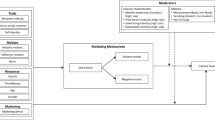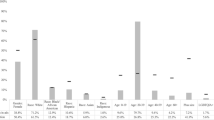Abstract
Research in the U.S. on fair trade consumption is sparse. Therefore, little is known as to what motivates U.S. consumers to buy fair trade products. This study sought to determine which values are salient to American fair trade consumption. The data were gathered via a Web-based version of the Schwartz Value Survey (SVS) and were gleaned from actual consumers who purchase fair trade products from a range of Internet-based fair trade retailers. This study established that indeed there are significant interactions between personal values and fair trade consumption and that demographics proved to be useless in creating a profile of the American fair trade consumer.
Similar content being viewed by others
References
Allen M. W. (2001) A Practical Method for Uncovering the Direct and Indirect Relationships Between Human Values and Consumer Purchases. The Journal of Consumer Marketing 18, 102
Anderson W. T., W. H. Cunningham (1972) The Socially Conscious Consumer. Journal of Marketing 36, 23–31
Auger P. B., T. M. Devinney, J. J. Louviere (2003) What will Consumers Pay for Social Product Features?. Journal of Business Ethics 42, 281–304
Barnea M., S. H. Schwartz (1998) Values and Voting. Political Psychology 19, 17–40
Berkowitz L., K. G. Lutterman (1968) The Traditional Socially Responsible Personality. Public Opinion Quarterly 32, 169–185
Bhate S., K. Lawler (1997) Environmentally Friendly Products: Factors that Influence Their Adoption. Technovation 17, 457–465
Blackwell R. D., P. W. Miniard and J. F. Engel: 2001, Consumer Behavior, 9th Edition (Harcourt, New York)
Blend J. R., E. O. van Ravenswaay (1999) Measuring Consumer Demand for Ecolabeled Apples. American Journal of Agricultural Economics 81, 1072–1078
Bond M. H., V. M.-Y. Chi (1997) Values and Moral Behavior. Psychologia 40, 251–264
Boote A. S. (1981) Market Segmentation by Personal Values and Salient Product Attributes: Demographics Only Tell Part of the Story. Journal of Advertising Research 21, 29–35
Borgmann A. (2000) The Moral Complexion of Consumption. Journal of Consumer Research 26, 418–422
Carrigan M., A. Attalla (2001) The Myth of the Ethical Consumer—Do Ethics Matter in Purchase Behaviour?. Journal of Consumer Marketing 18, 560–577
Davies I. A., A. Crane (2003) Ethical Decision Making in Fair Trade Companies. Journal of Business Ethics 45, 79
De Pelsmacker P., L. Driesen, G. Rayp (2005a) Do Consumers Care About Ethics? Willingness to Pay for Fair-Trade Coffee. Journal of Consumer Affairs 39, 363–385
De Pelsmacker P., W. Janssens, E. Sterckx, C. Mielants (2005b) Consumer Preferences for the Marketing of Ethically Labelled Coffee. International Marketing Review 22, 512–530
De Pelsmacker P., W. Janssens, E. Sterckx, C. Mielants (2006) Fair-Trade Beliefs, Attitudes and Buying Behaviour of Belgian Consumers. International Journal of Nonprofit and Voluntary Sector Marketing 11, 125–138
Devos T., D. Spini, S. H. Schwartz (2002) Conflicts Among Human Values and Trust in Institutions. British Journal of Social Psychology 41, 481–494
Dickson M. A. (2000) Personal Values, Beliefs, Knowledge, and Attitudes Relating to Intentions to Purchase Apparel from Socially Responsible Businesses. Clothing and Textiles Research Journal 18, 19–30
Dickson M. A (2001) Utility of No Sweat Labels for Apparel Consumers: Profiling Label Users and Predicting Their Purchases. The Journal of Consumer Affairs 35, 96–120
Dickson M. A., M. A. Littrell (1997) Consumers of Clothing from Alternative Trading Organizations: Societal Attitudes and Purchase Evaluative Criteria. Clothing and Textiles Research Journal 15, 20–33
Dietz T., L. Kalof, P. C. Stern (2002) Gender, Values, and Environmentalism. Social Science Quarterly 83, 353–364
Durgee, J. F., G. C. O’ Connor and R. W. Veryzer: 1996, ‹Observations: Translating Values into Product Wants’, Journal of Advertising Research Jan-Feb, 90–100
Ellen P. S., J. L. Wiener, C. Cobb-Walgren (1991) The Role of Perceived Consumer Effectiveness in Motivating Environmentally Conscious Behaviors. Journal of Public Policy and Marketing 10, 102–117
Feather N. T. (2004) Value Correlates of Ambivalent Attitude Toward Gender Relations. Personality and Social Psychology Bulletin 30, 3–12.
FLO-FAQ: n.d., ‹FAQ’, Retrieved August 1, 2006, from http://www.fairtrade.net/figures.html?and0=
Goldsmith R. E., J. Freiden, K. V. Henderson (1995) The Impact of Social Values on Food-Related Attitudes. The Journal of Product and Brand Management 4, 6–14
Goldsmith R. E., J. B. Freiden, J. C. Kilsheimer (1993) Social Values and Female Fashion Leadership: A Cross-Cultural Study. Psychology and Marketing 10, 399–412
Gould N. J. (2003) Fair Trade and the Consumer Interest: A Personal Account. International Journal of Consumer Studies 27, 341–345
Hitlin S., J. A. Piliavin (2004) Values: Reviving a Dormant Concept. Annual Review Sociology 30, 359–393
Homer P. M., L. R. Kahle (1988) A Structural Equation Test of the Value-Attitude-Behavior Hierarchy. Journal of Personality and Social Psychology 54, 638–646
Honkanen P., B. Verplanken (2004) Understanding Attitudes Towards Genetically Modified Food: The Role of Values and Attitude Strength. Journal of Consumer Policy 27, 401–420
Hudson, I. and M. Hudson: 2003, ‹How Alternative is Alternative Trade?: Alternative Trade Coffee in the Chiapas Region of Mexico’, Retrieved September 10, 2006, from http://fairtraderesource.org/HudsonHowAlternIsAlternTrade.pdf#search=%22hudson%22
Jaffee D., J. R. Kloppenburg, M. B. Monroy (2004) Bringing the “Moral Charge” Home: Fair Trade Within the North and Within the South. Rural Sociology 69, 169–196
Jones P., D. Comfort, D. Hillier (2003) Retailing Fair Trade Food Products in the UK. British Food Journal 105, 800–810
Kahle L. R., B. Poulos, A. Sukhdial (1988) Changes in Social Values in the United States During the Past Decade. Journal of Advertising Research 28, 35–41
Kamakura W. A., T. P. Novak (1992) Value-System Segmentation: Exploring the Meaning of LOV. Journal of Consumer Research 19, 119–132
Karp D. (1996) Values and Their Effect on Pro-Environmental Behavior. Environment and Behavior 28, 111–133
Kennedy P. F., R. J. Best, L. R. Kahle (1988) An Alternative Method for Measuring Value-Based Segmentation and Advertisement Positioning. Current Issues and Research in Advertising 11, 139–155
Krier, J. M.: 2005, ‹Fair Trade in Europe 2005’, The Heinrich Boll Foundation, Retrieved August 1, 2006, from http://www.ifat.org/downloads/marketing/FairTradeinEurope2005.pdf
LeClair M. S. (2003) Fighting Back: The Growth of Alternative Trade. Development 46, 66–73
Littrell, M. and M. A. Dickson: 1997, ‹Alternative Trading Organizations: Shifting Paradigm in a Culture of Social Responsibility’, Human Organization 56, 344–351
Loureiro M. L., J. Lotade (2005) Do Fair Trade and Eco-Labels in Coffee Wake up the Consumer Conscience?. Ecological Economics 53, 129–138
Lowe A. C.-T., D. R. Corkindale (1998) Differences in “Cultural Values” and Their Effects on Responses to Marketing Stimuli. European Journal of Marketing 32, 843–867.
Madrigal R. (1995) Personal Values, Traveler Personality Type, and Leisure Travel Style. Journal of Leisure Research 27, 125
Mainieri T., E. G. Barnett, T. R. Valdero, J. B. Unipan, S. Oskamp (1997) Green Buying: The Influence of Environmental Concern on Consumer Behavior. Journal of Social Psychology 137, 189–204
McCarty J. A., L. J. Shrum (1993) The Role of Personal Values and Demographics in Predicting Television Viewing Behavior: Implications for Theory and Application. Journal of Advertising 22, 77–101
Muller T. E. (1991) Using Personal Values to Define Segments in an International Tourism Market. International Marketing Review 8, 57–58
Neuman K. (1986) Personal Values and Commitment to Energy Conservation. Environment and Behavior 18, 53–74
Nicholls A. J. (2002) Strategic Options in Fair Trade Retailing. International Journal of Retail and Distribution Management 30, 6–17
Nordlund A. M., J. Garvill (2002) Value Structures Behind Proenvironmental Behavior. Environment and Behavior 34, 740–756
O’ Connor, I. J.: 1997, ‹Using Attitudinal Segmentation to Target the Consumer’, in L. R. Kahle and L. Chiagouris (eds.), Values, Lifestyles and Psychographics (Lawrence Erlbaum Associates, NY), pp. 231–246
Prakash V., J. M. Munson (1985) Values, Expectations from the Marketing System and Product Expectations. Psychology and Marketing (pre-1986) 2, 279–296
Prince-Gibson E., S. H. Schwartz (1998) Value Priorities and Gender. Social Psychology Quarterly 61, 49–67
Raynolds L. T., D. Murray, P. L. Taylor (2004) Fair Trade Coffee: Building Producer Capacity Via Global Networks. Journal of International Development 16, 1109–1121
Rice R. A. (2001) Noble Goals and Challenging Terrain: Organic and Fair Trade Coffee Movements in the Global Marketplace. Journal of Agricultural and Environmental Ethics 14, 39–66
Roberts J. A. (1995) Profiling Levels of Socially Responsible Consumer Behavior: A Cluster Analytical Approach and Its Implications for Marketing. Journal of Marketing Theory and Practice 3, 97–117
Roberts J. A. (1996) Green Consumers in the 1990s: Profile and Implications for Advertising. Journal of Business Research 36, 217–231
Roccas S., L. Sagiv, S. H. Schwartz, A. Knafo (2002) The Big Five Personality Factors and Personal Values. Personality and Social Psychology Bulletin 28, 789–801
Rohan M. J. (2000) A Rose By Any name? The Values Construct. Personality and Social Psychology Review 4, 255–277
Ryckman R. M., D. M. Houston (2003) Value Priorities in American and British Female and Male University Students. The Journal of Social Psychology 143, 27–138
Sagiv L., S. H. Schwartz (1995) Value Priorities and Readiness for Out-Group Social Contact. Journal of Personality and Social Psychology 69, 437–448
Sawyerr O. O., J. Strauss, J. Yan (2005) Individual Value Structure and Diversity Attitudes: The Moderating Effects of Age, Gender, Race, and Religiosity. Journal of Managerial Psychology 20, 498–521
Schultz P. W., L. Zelenzy (1998) Values and Proenvironmental Behavior. Journal of Cross-Cultural Psychology 29, 540–558
Schwartz, S. H.: 1992, ‹Are There Universal Aspects in the Structure and Content of Human Values?’, in M. Zanna (ed.), Advances in Experimental Social Psychology 25 (Academic, Orlando, FL), pp. 1–65
Schwartz S. H. (1994) Are There Universal Aspects in the Structure and Contents of Human Values. Journal of Social Issues 50, 19–45
Schwartz S. H., A. Bardi (2001) Value Hierarchies Across Cultures: Taking a Similarities Perspective. Journal of Cross-Cultural Psychology 33, 268–290
Schwartz S. H., W. Bilsky (1987) Toward a Universal Psychological Structure of Human Values. Journal of Personality and Social Psychology 53, 550–562
Schwartz S. H., W. Bilsky (1990) Toward a Theory of the Universal Content and Structure of Values: Extensions and Cross-Cultural Replications. Journal of Personality and Social Psychology 5, 878–891
Schwartz S. H., S. Huismans (1995) Value Priorities and Religiosity in Four Western Religions. Social Psychology Quarterly 58, 88–107
Schwartz S. H., T. Rubel (2005) Sex Differences in Value Priorities: Cross-Cultural and Multimethod Studies. Journal of Personality and Social Psychology 89, 1010–1028
Schwartz S. H., L. Sagiv, K. Boehnke (2000) Worries and Values. Journal of Personality 68, 309–346
Schwepker C. H., T. B. Cornwell (1991) An Examination of Ecologically Concerned Consumers and Their Intention to Purchase Ecologically Packaged Goods. Journal of Public Policy and Marketing 10, 77–101
Shaw D., I. Clarke (1999) Belief Formation in Ethical Consumer Groups: An Exploratory Study. Marketing Intelligence and Planning 17, 109
Shaw D., E. Grehan, E. Shiu, L. Hassan, J. Thomson (2005) An Exploration of Values in Ethical Consumer Decision Making. Journal of Consumer Behaviour 4, 185–200
Shaw D., T. Newholm (2002) Voluntary Simplicity and the Ethics of Consumption. Psychology and Marketing 19, 167–179
Shean G. D., T. Shei (1995) The Values of Student Environmentalists. Journal of Psychology 129, 559–564
Shrum L. J., J. A. McCarty, T. M. Lowrey (1995) Buyer Characteristics of the Green Consumer and Their Implications for Advertising Strategy. Journal of Advertising 24, 71–82
Strong C. (1997) The Problems of Translating Fair Trade Principles into Consumer Purchase Behavior. Marketing Intelligence and Planning 15, 32
Taylor P. L., D. L. Murray, L. T. Raynolds (2005) Keeping Trade Fair: Governance Challenges in the Fair Trade Coffee Initiative. Sustainable Development 13, 199–208
TransFair: 2006, ‹Fair Trade Almanac’, Transfair USA, Retrieved September 2006, from http://www.transfairusa.org/pdfs/2005FTAlmanac3.17.06.pdf
TransFair: 2007, ‹Frequently Asked Questions-Basic’, Retrieved January 25, 2007, from http://www.transfairusa.org/content/resources/faq.php
Van Liere K. D., R. E. Dunlap (1980) The Social Bases of Environmental Concern: A Review of Hypotheses, Explanations, and Empirical Evidence. Public Opinion Quarterly 44, 181–197
Author information
Authors and Affiliations
Corresponding author
Rights and permissions
About this article
Cite this article
Doran, C.J. The Role of Personal Values in Fair Trade Consumption. J Bus Ethics 84, 549–563 (2009). https://doi.org/10.1007/s10551-008-9724-1
Received:
Accepted:
Published:
Issue Date:
DOI: https://doi.org/10.1007/s10551-008-9724-1




